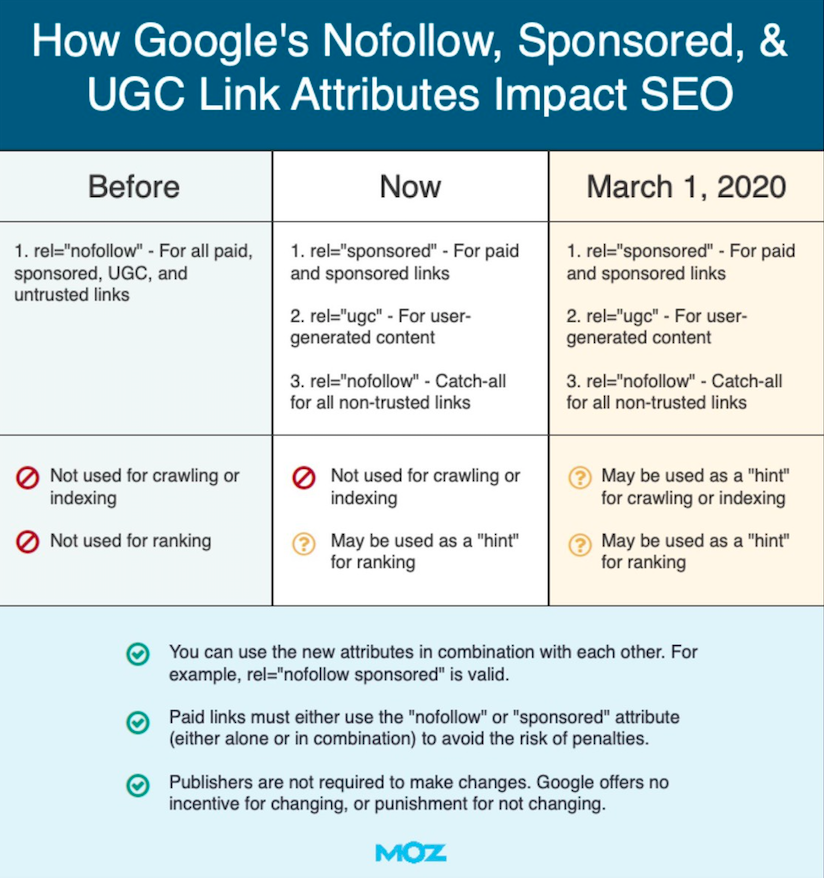3 min read
Honchō Scoops Up Two UK Search Awards!
It’s official, we've added not one, but two shiny trophies to our awards cabinet! We’re over the moon to share that we’ve triumphed at the UK Search...
2 min read
.jpg) Honcho
:
Sep 11, 2019 12:07:06 PM
Honcho
:
Sep 11, 2019 12:07:06 PM
The Outreach team at Honchō were excited by Google’s announcement of big changes in how they categorise backlinks. We now have two additional attributes to the rel=”nofollow” mark up:
No-follow links are not used as ranking signals and therefore provide no value toward improving rankings.
Right now when Google finds a no-follow link it may act as a hint towards improved rankings even though it won’t be crawled. That being said, in March 2020 Google may start crawling these links if they think it is valuable.
Rel=”sponsored”: Identifies links on websites that have been created as part of an advertising or sponsorship agreement.
Rel=”ugc”: Identifies links that appear within user generated content. EG, links within comments and forum posts.
All three of these link attributes will now be treated as hints so Google can determine what links to exclude as ranking signals.
“Links contain valuable information that can help us improve search, such as how the words within links describe content they point at. Looking at all the links we encounter can also help us better understand unnatural linking patterns. By shifting to a hint model, we no longer lose this important information, while still allowing site owners to indicate that some links shouldn’t be given the weight of a first-party endorsement.” Google explained.
Google has also mentioned you can use a combination of link attributes together in one link. Eg: rel=”sponsored ugc”
Don’t panic, you do not need to go back through every page of your website and update existing links to one of the new attributes. Google will neither award nor penalise you for this. Moving forward, use the link attributes accordingly as they are still important and will avoid you being hit by a link penalty.

In 2005, Google introduced no-follow links to address comment spam and black hat links from user generated content. As UGC links could harm your website, no-follow was introduced as a way to protect you. No-follow links were also used for any paid or sponsorship links to protect your website from a link penalty.
After working in the industry for 7 years, I think the message Google are trying to tell us is that links are still important and should be used to help the user find more, better content that will help satisfy their search. I also think Google are still trying to figure out the good links and the bad links and what percentage of links these days are actually being influenced by money or similar.
What do you think about Google adding the new link attributes? Let us know! Tweet us @honcho_search or get in touch on Instagram or LinkedIn to share your thoughts. Like keeping up with the latest news and industry updates? Sign up to our newsletter!

3 min read
It’s official, we've added not one, but two shiny trophies to our awards cabinet! We’re over the moon to share that we’ve triumphed at the UK Search...

5 min read
Understand ecommerce attribution models which attribution models can maximise your marketing efforts and ROI.

3 min read
Explore how social commerce is changing the way we shop online, blending social interactions with digital commerce for a seamless buying experience.